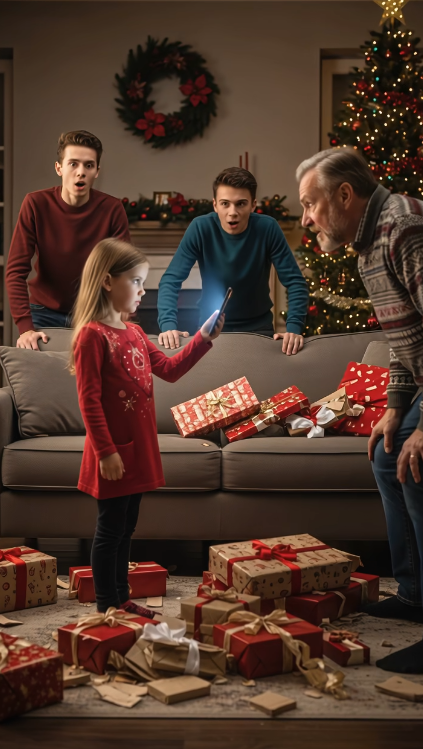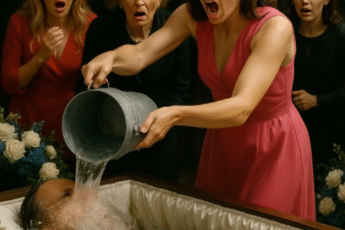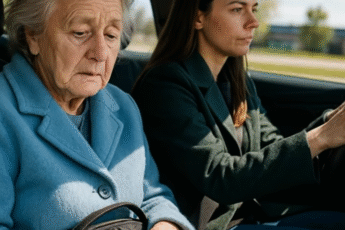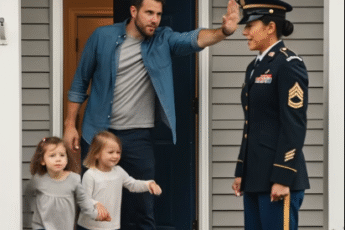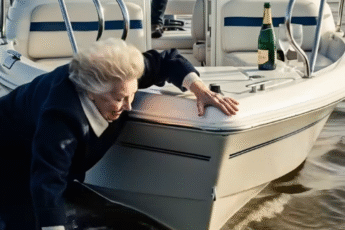My seven-year-old niece ruined Christmas, and in doing so, she became the person I am most proud of in this world. I woke at 6:00 a.m. to the sound of shattering glass. My first thought was a break-in, but when I ran downstairs, I found my niece, Poppy, standing amidst the wreckage of her cousins’ presents, a hammer still clutched in her small hand.
“Our presents!” the boys, 13 and 15, screamed, dropping to their knees to pick up the crushed remains of their tablets and gaming headsets. My brother, David, their father, started for the hallway closet to grab his belt, his eyes locked on Poppy. But before he could take a step, his sons lunged at Poppy, tackling her to the ground. They hit her, clawed at her face, and no one moved to intervene. I had to pull them off myself.
When Poppy got to her feet, she was bruised and bleeding from a gash above her eyebrow. Yet, she sat down calmly, her chest puffed out, a smirk on her face. It was as if she was proud of what she had done.
“Where are our good presents?” the boys screamed again. That’s when everyone noticed. The PlayStations, the iPhones, all the expensive gifts, were gone. Not destroyed, not wrapped, just vanished.
“Poppy,” I said quietly, kneeling beside her as David restrained his sons, who were now trying to get knives from the kitchen. “Tell me what happened.”
She looked at the horrified family members who had gathered around. “Your sons are bullies,” she said to David, blood still dripping from her eyebrow.
“You little—” he lunged at her, but I grabbed him.
“Last year, they destroyed my friend’s Christmas present,” Poppy continued, her voice unwavering. “Her mom saved for six months for that dollhouse. They stomped on it while she cried.”
David’s wife tried to defend them, but Poppy’s voice cut through the room. “This whole year, they’ve destroyed every present I got. They smashed my birthday telescope. They set my art set on fire.”
“We never knew,” David started, but Poppy cut him off.
“I told everyone at Thanksgiving,” she said, her voice rising. “I told you they ruined the only photo I had of my mommy and daddy before they died.” Poppy was crying now. “And you said I should stop being mad at them, that they were just kids playing.”
I was horrified. Working overseas, I had no idea this had been happening. “Is this true?” I asked, my voice sharp. The room grew uncomfortable. No one would meet my eyes.
Poppy wiped the blood from her face. “So yeah, I destroyed their presents.”
The mother gasped. “Those presents? But that’s not why I did it!” Poppy interrupted. The room fell silent.
“Sweetheart, why did you do it then?” I asked her.
That’s when she pointed to our grandmother, sitting in the corner in her Christmas pajamas, lost in the fog of her dementia. “They stole from Grandma. They stole $2,000 from her.”
The boys’ faces dropped, the first genuine emotion they had shown. David’s eyes widened. “That’s impossible.”
“Last Tuesday night, I couldn’t sleep,” Poppy said, standing defiantly. “I heard footsteps in Grandma’s room at 2 a.m. I watched your kids take her card from her purse. They found her PIN in her diary. Then they snuck out. I followed them to the ATM.”
“You’re lying,” one of the boys stammered.
“I have a video,” Poppy said, pulling out her phone. The video showed them withdrawing huge stacks of cash. They began to shake. Their father grabbed Grandma’s phone with trembling hands and checked the withdrawals. His face went pale.
“Son, why would you—”
“She gave us that money!” the boys shouted, a last, desperate lie.
Poppy ran upstairs and returned with a letter in Grandma’s shaky handwriting. “Dear Poppy,” it read, “I’m getting worse. Some days I don’t remember breakfast, but I remember the $2,000 I saved for the Christmas charity. I want poor families to have presents. If I forget, please remind me. Love, Grandma.”
David was on the verge of tears. “Why didn’t you tell me, Poppy?”
“I did!” she shouted. “And you told me to stop lying. You slapped the phone out of my hand when I tried to show you the video. You hit me when I tried to look for the money.” He buried his face in his hands, consumed by shame.
“So, at 3:30 this morning,” Poppy continued, “I listed all my cousins’ best presents online for free. That’s why they’re gone. People came to get them in minutes. I didn’t take a penny.”
No one could protest. The boys made a move for Poppy’s phone, but she dodged them. “I already backed it up, just like Uncle taught me. You can’t delete it now.”
David turned to me, his voice desperate. “You’re her favorite uncle. Make her delete the video. We’ll handle this as a family.”
I looked at my seven-year-old niece, standing her ground against boys twice her size. “I think she already has.”
But then, while David’s wife was checking their bank account, the older boy bolted to the kitchen. He reappeared with a knife and ran at Poppy. I threw myself forward, grabbing his wrist just as he reached her. The knife was inches from her face. He fought back, his brother jumping in to help. I felt the blade slice across my forearm, hot pain shooting up my arm, but I didn’t let go. I finally bent his wrist back until he screamed and dropped the knife. I kicked it under the stove, out of reach.
Blood was soaking my sleeve and dripping onto the floor. I shoved the older boy back and stepped between him and Poppy. David’s wife screamed when she saw the blood. David just stood there, his mouth agape.
“Nobody moves toward that knife or toward Poppy,” I said, my voice loud and clear.
“Poppy, take Grandma upstairs to the bathroom and lock the door,” I ordered. She guided Grandma up the stairs while I blocked the boys. Once I heard the lock click, I pulled out my phone and dialed 911.
“We have a juvenile who attacked a seven-year-old child with a knife,” I said quickly. “Multiple injuries and suspected elder financial abuse. We need police and an ambulance.”
David tried to grab the phone. “Hang up! We can handle this as a family!”
I shrugged him off and gave the operator our address. Units were on the way. David’s wife was crying, showing him the bank statements on her phone. Thousands of dollars were missing. The younger boy sprinted for the stairs, yelling about deleting something from his computer, but I body-blocked him.
“You’re not going anywhere near Poppy or deleting anything,” I said. “The police are on their way, and all the evidence is backed up.”
From upstairs, Poppy’s small voice came through the door. “The video is saved in three different places, just like you taught me.”
The sound of sirens grew louder. The front door burst open, and two cops walked in. “I’m the one who called,” I said, raising my good hand. “There’s a knife under the stove.”
The lead officer, a big guy with gray hair, took one look at the blood and the chaos and nodded to his partner. He came straight to me. “Tell me what happened, fast.”
I pointed at the older boy, then explained what he had done. The officer’s jaw tightened as I told him about the stolen money, the destroyed presents, and the years of bullying. His partner cuffed the older boy. The younger one started crying and was told to sit on the front steps.
I called for Poppy and Grandma to come down. The officer’s face changed when he saw Poppy’s injuries. He immediately radioed for paramedics. “Sweetheart, do you feel safe showing me that video?” he asked gently.
Poppy pulled out her phone and played the video. David’s wife sobbed with each transaction. The officer watched, then looked at the boys with disgust. An ambulance arrived, and two paramedics rushed in. They cleaned and bandaged my arm, then moved to Poppy, saying she needed stitches and an X-ray.
Grandma kept asking what was wrong, trying to touch Poppy’s face. The officer retrieved the knife from under the stove, sealing it in an evidence bag. I gave my formal statement, detailing everything. When the officer asked about prior incidents, my stomach dropped. All the times Poppy had tried to tell us, and we had ignored her.
David mumbled something about “kids will be kids,” but the officer’s face was hard. “We’re looking at assault with a deadly weapon, elder financial abuse, and ongoing child abuse allegations,” he said. “The state takes elder theft very seriously. This will trigger mandatory reports to Child Protective Services and Adult Protective Services.”
Grandma wandered into the hallway. “Where’s my purse?” she asked, her voice confused. “I need to give money to the poor families for Christmas.” David’s wife covered her face in shame. The officer asked for the bank statements, and she pulled them up on her phone. Each withdrawal matched the timestamps on Poppy’s video.
The officer asked if I wanted to press charges and get a protective order for Poppy. I said yes without hesitation. David begged me not to, saying it would ruin his sons’ futures. I looked him in the eye and reminded him that his son had just tried to stab my niece.
The ambulance ride was quiet. Poppy, her adrenaline finally wearing off, explained how she had listed the presents online for free, how people had shown up within minutes to take them. At the ER, a triage nurse marked Poppy’s case as suspected abuse and took us straight to a room. She took pictures of every bruise and scratch, asking Poppy gentle questions. Dr. Jules Madison stitched Poppy’s eyebrow, talking about her cat and favorite movies to keep her distracted. I held Poppy’s hand as she got five stitches, my heart swelling with pride at her bravery.
A social worker from CPS arrived, explaining that a report was mandatory. She said it would help us get protection orders and services faster. My phone buzzed. A text from the officer. The knife was logged as evidence, and both boys were at juvenile intake. The older one might face detention. The younger one would likely be released to a relative. I messaged my boss overseas, explaining I needed emergency leave.
David texted, pleading with me not to help with the prosecution. I took a screenshot and didn’t reply. This might be witness tampering. The ER was a blur of paperwork. I re-watched Poppy’s ATM video, saving it to three different cloud services and sending a copy to a trusted friend. This evidence had to be protected.
The social worker, Jenny, returned and said she needed to interview Poppy alone. I waited in the hallway, my stomach churning as I heard Poppy’s small voice describing years of abuse I never knew about. When Jenny came out, she asked if I could take Poppy temporarily. I said yes without a second thought. She called David right there in the hallway, and I could hear him yelling through the phone. Jenny calmly explained that a safety plan was being put in place immediately. The boys could have no contact with Poppy.
I showed Jenny Grandma’s letter, and she photographed it for her file. “Elder financial abuse combined with child assault makes this a serious case,” she said.
My phone rang. It was David’s wife, sobbing. She had found more evidence on the boys’ phones—texts bragging about making Poppy cry, videos of them destroying her things. She found searches on how to hurt someone without leaving marks. Her admission was too late, but I told her to share everything with the investigators.
We were finally discharged around noon. Poppy fell asleep in the car, exhausted. I drove to my apartment, my mind reeling. I wasn’t really set up for a kid, but we would figure it out. I carried her inside and put her on my bed. She looked so small with all her bandages. I sat beside her, a folder an inch thick with resources and phone numbers in my lap. It was overwhelming, but Poppy was safe now.
The court hearing was three days later. The judge looked at all the evidence—the video, the photos of Poppy’s injuries, the bank records—and ordered the boys to stay away from Poppy. No contact at all. They had to stay with their aunt while CPS investigated.
The juvenile intake officer told me the older boy was defiant, but the younger one had broken down and admitted everything. They were looking at diversion programs if the boys showed remorse. That afternoon, I took Poppy to buy a safe for all the important papers and backup copies of her evidence. She chose the combination herself—the date her parents died and her mom’s birthday.
The preliminary juvenile hearing resulted in a diversion program: the boys had to pay back the money, go to counseling, and do community service. If they completed it, they wouldn’t have formal charges. I agreed, but only if the protective orders stayed in place. The judge added that the boys had to stay in counseling for at least six months.
My employer gave me one month of unpaid leave. The boys made their first restitution payment—$50 from the older one’s McDonald’s check and $20 from the younger one’s paper route. It would take them years to pay back the full $2,000, but it was a start.
That night, I sat on my couch with Poppy asleep next to me, her head on my shoulder. I wrote in a notebook: 1. Keep Poppy safe. 2. Show up to all appointments. 3. Take things one day at a time. The family was broken, money was tight, and nothing was neat and clean. But Poppy was here, breathing steady against my arm, finally getting some real sleep. For now, that had to be enough.
